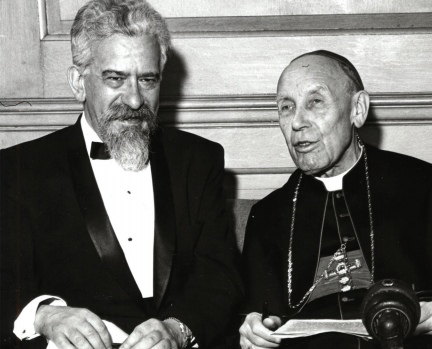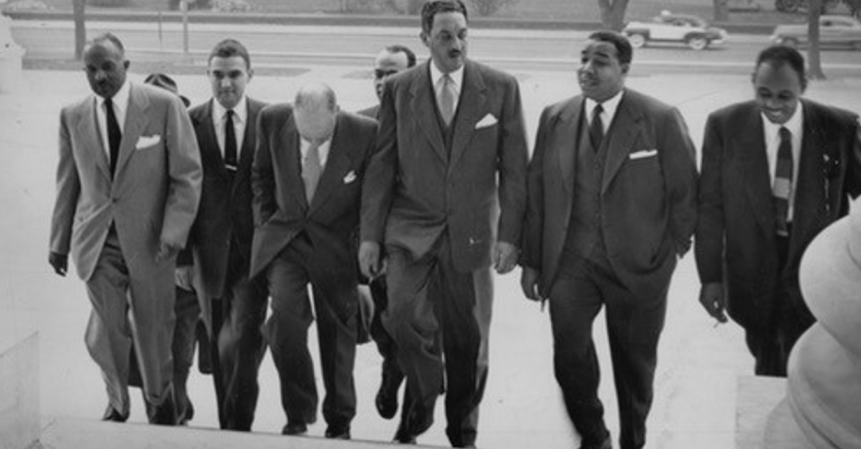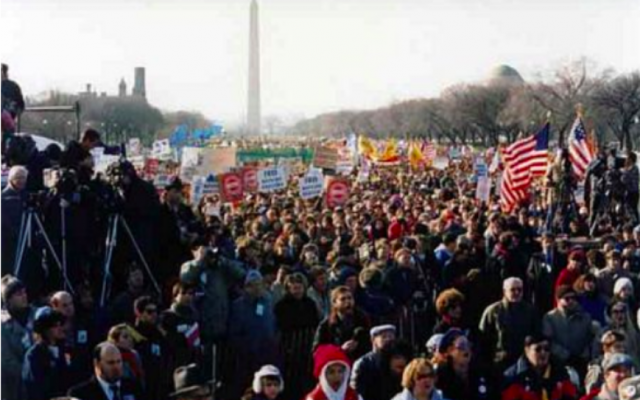75 Never Looked Better: A Celebration of AJC Atlanta
Take a look back at 75 years of the AJC Atlanta’s work in community and relationship building.
During AJC’s 75-year history in Atlanta, the organization has made significant strides in advocating for Israel, combating anti-Semitism, and developing strong ties with government officials, diplomats and other world leaders.
AJC has become well-renowned for these achievements, but the organization also transcends the simplistic implications of Jewish advocacy. The core principles of Judaism compel its followers to treat their neighbors with compassion and aid the less fortunate in times of need.
Taking this notion of tzedek tzedek tirdof (justice justice, you shall pursue) to heart, AJC has been the modern-day model of these tenets time and time again. So, in hopes of bestowing some well-deserved justice upon THEIR selfless acts of justice, I have written a brief history of AJC’s most important milestones.
Championing equality through religious diversity:
Over a half-century ago, AJC played an instrumental role in setting the precedent for the modern Catholic-Jewish relationship. In 1965, the Catholic Church published the Second Vatican Council’s most historic document on interfaith relations, known today as “Nostra Aetate.”

Before the publication of “Nostra Aetate,” the wide-held belief among the Catholic community was that Jews were responsible for the death of Jesus Christ, and anti-Semitic sentiments were largely tolerated. But “Nostra Aetate” condemned this notion and emphasized the kinship between Catholics and Jews, citing their common heritage and their shared belief that all people were created in the image of G-d. Religious tolerance became a main focus of the Catholic Church and paved the way for interfaith relations for years to come.
The implementation of “Nostra Aetate” was due in large part to AJC and Rabbi Abraham Joshua Heschel, the pragmatic Jewish leader who worked closely with Pope John XXIII. Rabbi Heschel’s unwavering determination ensured that the Vatican’s policy was conducive to the needs of the Jewish community. Since the Second Vatican Council’s earliest days, AJC was involved with Catholic-Jewish meetings, and they were ultimately the force that brought Rabbi Heschel into interreligious discussions at the Vatican. The spirit of “Nostra Aetate” is alive and well in Atlanta today, as evidenced by Archbishop Wilton Gregory, who was recently promoted to archbishop of Washington, D.C. Archbishop Gregory is committed to partnering with AJC and ensuring the continuation of a robust and healthy relationship between Catholics and Jews. AJC Atlanta works closely with the Roman Catholic Church by orchestrating meetings between religious leaders of both communities and by hosting their annual “Nostra Aetate” celebration, where over 200 Catholics and Jews convene to discuss issues facing both communities and the world at large.
AJC behind the Iron Curtain:
In 1987, when Bon Jovi had the country “Livin’ on a Prayer” and the Bangles were teaching us how to “Walk Like An Egyptian,” AJC was singing its own tune. Since the 1960s, AJC had marched and protested on behalf of Jews stuck behind the Iron Curtain. In early 1987, five members of AJC Atlanta, led by director Sherry Frank, visited the USSR to deliver medicine and other necessities to trapped refuseniks (Soviet Jews refused permission to emigrate) facing brutal treatment at the hands of their government.
The pinnacle of these efforts came later in the year, on what came to be known as Freedom Sunday. Coordinated by David Harris, now AJC’s CEO and the director of AJC’s Washington office at the time, the Freedom Sunday march is often considered the linchpin in securing Soviet attention toward the issue of oppressed Jewry.
On that fateful, frigid morning of Dec. 6, a sizeable delegation from AJC Atlanta joined more than a quarter-million demonstrators in D.C., Jewish and non-Jewish alike, to capture the attention of Mikhail Gorbachev (then, the general secretary of the Soviet Union) on his first visit to the U.S. As the largest Jewish rally in U.S. history, with participation from notable political figures like then Vice President George H. W. Bush, the age-old cry of “Let My People Go” was heard loud and clear by Gorbachev. Soon after the event, 2 million Jews were allowed to emigrate from the Soviet Union.
Today, decades after the dissolution of the USSR, AJC has two offices in Central Europe, with the goal of advocating on behalf of Jews who were once under Soviet control. The threat of anti-Semitism is unfortunately alive and well in these regions, and AJC’s continued presence ensures the creation and support of policy that helps Jews in Czechia, Estonia, Hungary, Latvia, Lithuania, Poland and Slovakia.
Pioneering Black/Jewish Relations:
AJC’s ties with the black community are deep and longstanding. In 1950, AJC hired a black psychologist, Kenneth Clark, to report upon the developmental detriments of teaching children in segregated schools. These findings later played a key role in the landmark case Brown v. Board of Education, which overturned the “separate but equal” ruling of 1896. Not only did AJC Global help to create a legislative framework conducive to social change, AJC Atlanta also took direct action.

In 1960, members of AJC Atlanta met with the superintendent of Atlanta City Schools to ensure that transition into integration went smoothly for all parties involved. AJC then took a historic step in becoming the first Jewish group in Atlanta to make a concrete contribution toward integration by paying for three teachers to attend a human relations workshop in Boston, where the teachers learned how to create welcoming environments for diverse students.
The friendship between the Jewish and black communities is still thriving. In 1982, members of the Jewish and black communities in Atlanta convened to discuss the renewal of the Voting Rights Act. Their conversations and mutual interests ignited a spark between the two groups, and the Atlanta Black-Jewish Coalition was born.
As put by AJC Atlanta’s Assistant Director Julie Katz, “Today, the Atlanta Black-Jewish Coalition has emerged as a central platform for education, outreach and advocacy. As participation reaches new heights, the Coalition continues to build on its original mission by providing a forum for meaningful dialogue and action.”
The legacy of collaborative effort between the black and Jewish communities was reaffirmed on a national level at AJC’s 2019 Global Forum, when congressional representatives Brenda Lawrence (D-Mich.), Lee Zeldin (R-N.Y.), and Debbie Wasserman-Schultz (D-Fla.) announced the launch of a Congressional Black-Jewish Caucus. Forty Atlanta participants of the Global Forum lobbied at Capitol Hill to request that other congressional representatives join the caucus to encourage the black and Jewish communities to join forces in their advocacy.
Although these accomplishments comprise only a small part of AJC Atlanta’s work, they hold great relevance today, as they laid the foundations for AJC’s intergroup relations. Although AJC will confront new forms of bigotry as time progresses, its commitment to justice will remain steadfast. As AJC continues to advocate on behalf of Jewry and all minority communities to make the world a safer and better place, we look forward to a greater future for all.
Isabelle Mokotoff is a journalism intern at the AJC.




comments